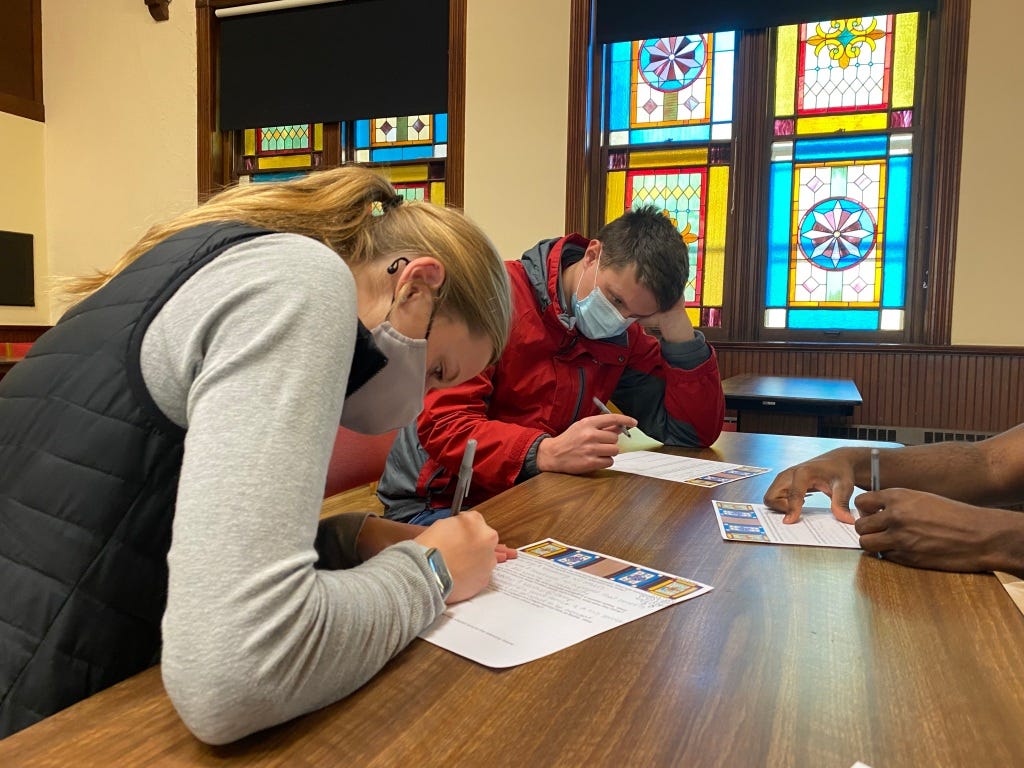ARRAN KEARNEY
Staff Writer
Last week's Chapel service was significantly different from any in recent times. The opening and closing prayers were the same, as tradition would demand, but the purpose of the meeting this week was to, as Pastor Michael Unruh said, explore “possibilities for Chapel (or worship more generally) to engage a broader section of the Bethel community.” This aim of widening “community engagement” has been a key goal for Unruh since his arrival at Bethel College some eighteen months ago, and he views Chapel as being essential to this end.
The Chapel services on the Green were, for a time in fall of 2020, one of the few official events taking place on campus. Unruh, in his first interview with this publication, said that he wanted the weekly service to be “a space where people from many backgrounds will be excited to attend.”
Widening the reach and work of the campus ministry still remains Unruh’s chief goal and it was reflected in last week’s Chapel meeting. Unruh believes that Chapel has around 25 regular or semi-regular attendees, with the service itself attracting “probably around fifteen staff and students a week.” This is a “a pretty small percentage of the campus community,” Unruh said, though he also placed the problem within its wider context. The sense that greater campus engagement is possible is “something that has been around for quite a few years.”
Unruh referenced the recent Faith Formation Survey as being indicative of students’ lack of participation in the current organized worship offerings. The intent of this survey was to encourage students “to think about and reflect on experiences of faith, spirituality, and life that you have had at Bethel College.” Students were asked to rank different experiences at the college by the impact that it had on their spiritual development.
“Conversations with other students came second, conversations with faculty and staff came fourth, and Chapel came sixth,” Unruh said.
This data serves as evidence, it would seem, that students lean more towards informal, even spontaneous discussions about faith.
This conclusion is far from negative.
“Conversation amongst students doesn’t need to be facilitated by something official,” said Unruh.
These sorts of sober, reflective conversations amongst students can instead be viewed as reflections of the strength of the Bethel College community, which the campus ministry is but a single part of.
It would seem that the key for Unruh lies in the promotion of community. This was, returning to last Wednesday’s Chapel service, certainly the conviction of the students in attendance. When asked to give an example of a time when they felt most spiritually engaged, many attendees spoke of times in camps and elsewhere when they had engaged in large and small group discussions, reflections and song, which are activities that bear remarkable similarities to the outcomes of the Faith Formation Survey.
Unruh believes that Student Chaplains are one key to making the ministry a “representation of the community” that will promote and realize “God’s presence within the community.”
“As I become more settled in the role, I will be better able to empower them,” Unruh said.
Student Chaplains already perform a great many duties on campus, hosting highly accessible and informal events throughout the week. Bible studies and morning prayers are regular features and are conveniently scheduled.
Campus Ministries are also planning several large-scale “Fellowship Events” for the coming semester, such as a Breakfast Night on Thursday, February 10th, and a Bible Trivia Night on Wednesday, March 16th.
Campus ministry has sometimes been prevented from hosting many events due to the pandemic, which has “added a lot of unwanted anxiety and stress to the lives of the students,” Unruh said. Alongside these Fellowship Events will be others, such as “24-hour Prayer” that is scheduled to take place at the Agape House from 6pm on Sunday, April 10 to 6pm on Monday, April 11.
Unruh is excited to use Campus Ministries resources to promote other worship and study events which form the backbone of community life, and said that he was “very receptive to any ideas coming out of the student body.” One of these resources, perhaps not well-known amongst students, is the Agape House. The house, situated just across the street from Bethel College Mennonite Church, has recently undergone some utility upgrades, with renovations planned in the near future. The house is readily available for students for faith and community building purposes.
“I have a key inside my office, and all you have to do is ask,” Unruh said.
Also worthy of note is the Interfaith Room, and Unruh also has plans to continue equipping this space This room, on the ground floor of the Administration Building beside the Student Life office, is available for prayer at and time the building is open.



